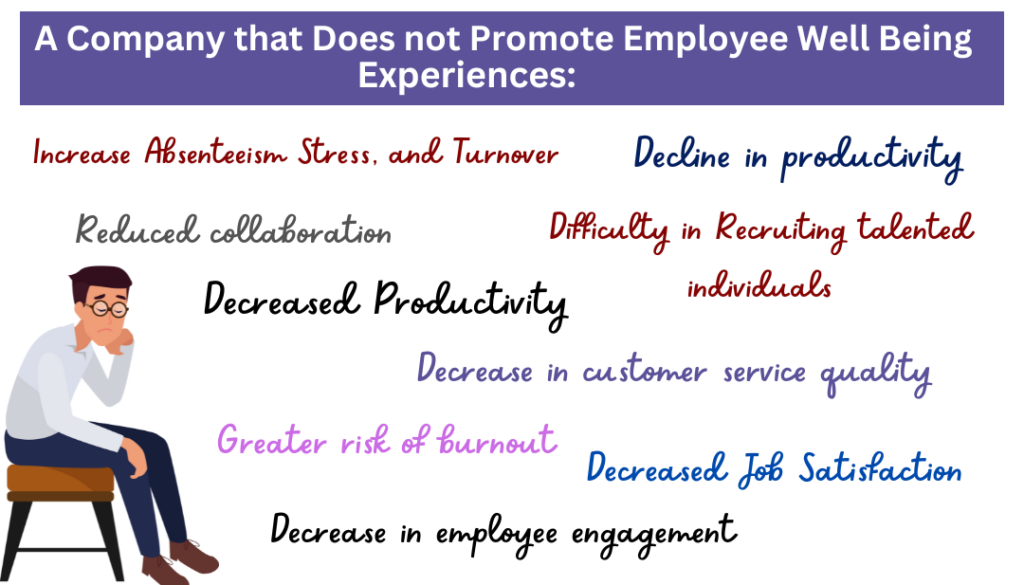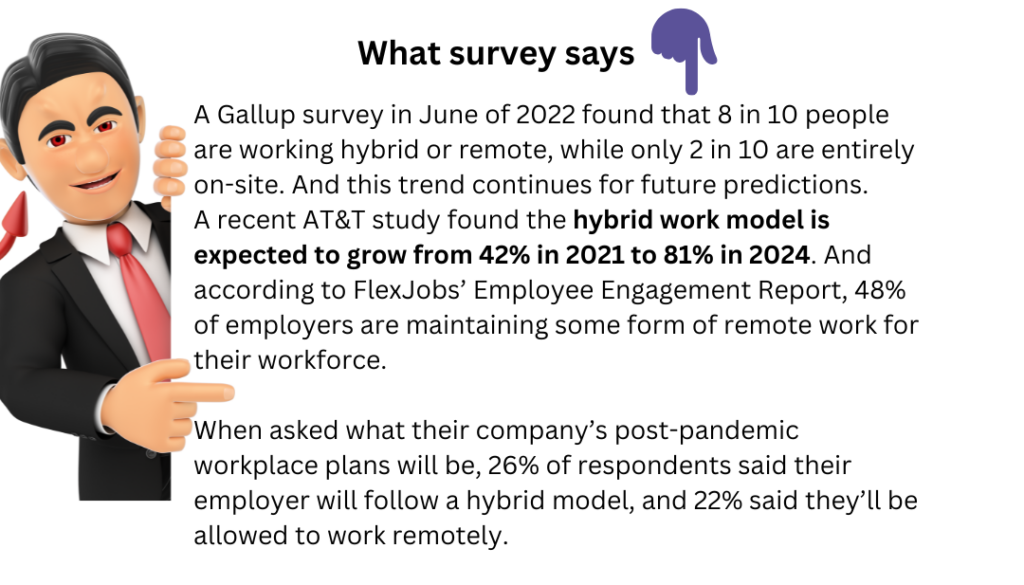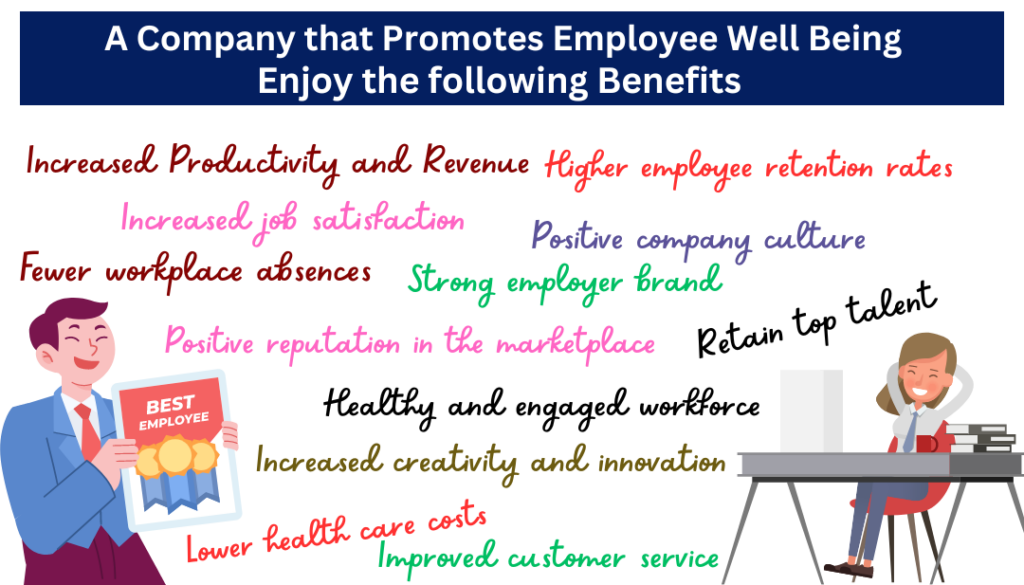What is employee wellbeing?
Employee wellbeing is a term used to describe employees’ overall health and happiness within a workplace. Employee wellbeing is an important factor that encompasses physical and mental health, job satisfaction, work-life balance, and other aspects of employee life. It is important because it plays a key role in creating a productive and positive work environment. Companies prioritizing employee wellbeing are more likely to have higher morale, better engagement levels, and improved job satisfaction, which lead to higher productivity and profitability.

The well-being of employees at the workplace is of paramount importance if organizations want to run smoothly and efficiently. Understanding the various factors that can affect employees’ overall well-being is essential. Some of the most common factors are:
Target pressure or Workload
One of the most common factors affecting employee well-being is target pressure. Many organizations set unrealistic employee targets, leading to excessive stress and anxiety. It can lead to physical and mental health issues, affecting the employee’s overall well-being. Organizations should set reasonable and achievable goals to avoid overburdening employees with unrealistic targets.
Relationships with colleagues and managers
Relationships with colleagues and managers have a major impact on employee well-being. Studies have found that people having positive relationships with their managers and colleagues tend to have better job satisfaction, higher engagement levels, and increased motivation. Such relationships can also play an important role in helping employees to cope with stress and can provide support during difficult times.
Positive relationships can create a sense of trust and help employees to feel secure in their roles. Therefore, it directly impacts employee well-being by reducing stress levels, increasing job satisfaction, and boosting morale. On the other hand, negative relationships between colleagues or between employees and their managers can lead to a decrease in job satisfaction and engagement and an increase in stress and anxiety. As a result, employees go through depression, fear, and low self-esteem when they feel unsupported, unappreciated, or even bullied.
Work-life balance
Another important factor that affects employee well-being is work-life balance. Achieving a balance between work and personal life is essential to maintain mental and physical health. Employees unable to manage their workload and personal commitments face a greater risk of burnout and exhaustion. Poor work-life balance can also lead to stress, fatigue, depression, and other mental health issues. The lifestyle of employees is also an important determinant of their well-being. Unhealthy eating habits, lack of physical activity, and inadequate sleep can contribute to poor mental and physical health, further affecting employee well-being.

Working environment
Having a healthy workplace culture is also important for employee well-being. Creating a positive and respectful atmosphere and ensuring everyone understands the company’s values and expectations are important. It helps in creating a sense of belonging, leading to greater job satisfaction and improved employee performance.
A positive working environment enables employees to work productively and effectively while feeling supported. Here employees have the right equipment and resources and access to meaningful training and development opportunities. Creating an open and collaborative atmosphere that encourages creativity and innovation can also help keep employees valued and engaged with their work.
Recognition and rewards
When companies fail to provide recognition and rewards to their employees, it can significantly negatively impact their morale and motivation levels. Companies can experience decreased productivity, decreased job satisfaction, increased absenteeism, decreased loyalty to the organization, and reduced collaboration among colleagues. Furthermore, a lack of recognition and rewards can create resentment and frustration among employees, leading to an increase in turnover rate and difficulty recruiting talented individuals.
Additionally, failing to reward employees for their hard work and accomplishments can lead to a decrease in overall engagement with the company, leading to a decrease in customer service quality and customer loyalty. Finally, employees fail to bring innovation when organizations don’t recognize or reward employees. Employees may become less likely to suggest new ideas or take risks due to a lack of appreciation or acknowledgment from their employer.
Career development opportunities
When companies do not provide employees with career development opportunities, it can harm their morale, productivity, and engagement. Without these opportunities, employees may feel stagnant in their positions and as if they are not progressing professionally. Employees start showing resentment towards their employers. Furthermore, without the chance to grow and develop, employees may not be motivated to perform at their best and may lack the necessary skills and knowledge required for the job. It overall creates an environment of low morale, high turnover, and low productivity. Additionally, employees may become disengaged from their work without career development opportunities and become less committed to their organizations. It somehow affects customer service, which can ultimately lead to lower profits.
Why must a company promote employee wellbeing? Lets us see this as a perspective through an example:
Rajesh had been an employee of a corporate company for the past few years. However, his performance has been subpar lately. He was often found dozing off at his desk, leaving his colleagues and the management concerned about his health. Unbeknownst to them, Rajesh was battling stress and depression, leaving him with little to no energy for himself, let alone his job. Then, the company’s management stepped in, displaying an unexpected altruism.
The management soon noticed the change in Rajesh’s demeanor, but instead of reprimanding or firing him, they identified the reason for it and decided to step in to help him out. The management organized health checkup programs for its employees. They gave Rajesh the support he needed to get back on track, providing him with medical consultation and financial assistance for his treatment. With the help of the management, Rajesh could get back on his feet and get back to work.
This story of Rajesh highlights the importance of an employer’s willingness to care for their employees inside and outside the office walls. Only through acts of kindness can a lasting relationship between an employer and employee be achieved. One cannot expect their employees to give utmost effort if they aren’t provided with the means.

What are the top strategies for promoting employee wellbeing?
Provide recognition and rewards
Recognition and rewards can have an enormous impact on employee well-being. When managers appreciate employees, they are more likely to be satisfied and engaged in their work, leading to improved performance. Studies have shown that recognition and rewards positively affect motivation, job satisfaction, morale, and commitment to the organization. Furthermore, when employees receive recognition and rewards for their hard work, it can help to build trust between them and their employers, creating a more positive working environment.
Rewards can also have a direct impact on employee wellbeing. Recognizing and rewarding employees for their accomplishments can make them feel valued and respected, leading to increased job satisfaction.
Additionally, providing rewards can provide a sense of accomplishment, boosting employees’ self-esteem and confidence. This, in turn, can lead to higher levels of job security and greater feelings of job satisfaction. Finally, rewards can boost employee engagement and productivity. When employees feel appreciated and rewarded, they are likelier to put in the extra effort to complete tasks and meet goals, resulting in increased overall well-being.
Create a positive work culture.
Creating a positive work culture is essential for employee well-being. A positive work culture helps create an environment that encourages collaboration and creativity while providing employees with the necessary resources and support they need to succeed. One of the most important aspects of creating a positive work culture is fostering an open and inclusive workplace. Companies can implement policies that promote diversity and inclusion, encourage open communication between employees, and provide a safe and respectful environment.
Moreover, it is important to provide employees with:
- Opportunities to grow, develop, and advance in their careers
- Offering training and educational opportunities
- Implementing flexible work arrangements
- Providing competitive salaries and benefits
When a positive work culture is established, employees feel more connected to their work and are more likely to be engaged and productive. They are also more likely to take pride in their work and feel as though their contributions are appreciated.
Offer flexible working hours and remote working
Companies should consider employees’ personal needs and schedules and offer flexible working hours and remote work options when possible.
Flexible working hours and remote working give employees greater control over their work-life balance, allowing them to manage their personal and professional commitments better. Additionally, flexible hours and remote working can help reduce commuting time, allowing employees to spend more time with family or pursue hobbies.
Furthermore, flexible and remote working can enable employees to achieve a better work-life balance, as they can adjust their work schedule to fit their family, health, and other commitments.

Flexible working hours and remote working also provide employees with greater autonomy and independence. It makes an employee more willing to take on additional responsibilities or roles, as their increased flexibility will make it easier for them to manage their workload.
Introduce meditation and mindfulness practices
The introduction of meditation and mindfulness practices in the workplace can positively impact both employers and employees. For employers, these practices can increase productivity and creativity and decrease absenteeism and turnover. For employees, these practices can help to reduce stress, increase job satisfaction, and improve overall psychological well-being.
Research has shown that meditation and mindfulness can lead to several cognitive and physiological benefits, such as improved concentration, greater calmness, and increased self-awareness.
Additionally, these practices can help to improve communication, reduce conflict, and foster more meaningful connections between colleagues. Finally, introducing these practices into the workplace can create an environment of positivity and acceptance, making employees feel safer and more open to expressing their opinions and ideas.
Promote team-building activities
Promoting team-building activities in the office positively impacts workplace morale, productivity, and overall company culture. This is what team-building activities do to an organization:
- Improves collaboration between employees
- Fosters communication and increases employee engagement.
- Creates an atmosphere of trust and respect
- Helps break down barriers between departments and teams
- Leads to an increase in innovation, problem-solving, and better organizational performance.
When team members feel supported and connected, they become more productive and creative. Additionally, team-building activities can bring together employees from different backgrounds, creating a more diverse and inclusive workplace. Lastly, by promoting team-building activities, companies can show their commitment to developing their workforce and creating a positive work environment, which can help attract and retain top talent.
Provide mental health resources and offer wellness programs
Providing mental health resources to employees helps reduce stress, increase productivity, and improve overall well-being. Access to mental health resources can help employees develop coping strategies, build resilience, and improve their mental health. By providing mental health resources, employers can create a supportive and understanding work environment, encouraging employees to speak up if they struggle with their mental health. Additionally, employers can find that providing mental health wellness programs can help to strengthen their public image and demonstrate their commitment to employee well-being.
Encourage breaks and rest
Encouraging breaks and rest time in the office is important to creating a productive and healthy workplace. Employers should encourage breaks and rest time in the office for a variety of reasons:
- Having frequent breaks can help employees remain focused and productive during their shifts. Regular breaks allow employees to take a few moments away from their desks, recharge, and refocus on the task.
- Taking regular breaks is beneficial for employee health and well-being. Sitting at a desk all day can be detrimental to both physical and mental health, and a short break can help employees clear their minds and reduce stress levels.
- Allowing regular breaks can help improve morale and job satisfaction, as employees feel supported by their employers and have the opportunity to take a step back and relax, even in a busy work environment.
- Providing employees with break time to socialize and build relationships outside their department can help improve workplace collaboration and teamwork.

CONCLUSION:
Employee wellbeing should be the priority of every organization. Employers must ensure that their employees have a healthy work-life balance, are satisfied with their working conditions, and have the tools and resources to be successful in their roles. Organizations that prioritize employee well-being are better positioned for long-term success.
Companies must provide a positive work environment so that employees can work to their full potential.
Employees should feel comfortable and motivated to come to work. Managers should also be available to discuss concerns or difficulties that employees may have.
One way to ensure employee well-being is to implement effective attendance and leave management and payroll management system. By actively monitoring employee presence and payroll, companies can contribute to well-being from these two factors. An attendance management system helps to ensure that all employees are punctual and productive, while a payroll management system ensures that employees are fairly compensated for their work. Both systems are essential for any workplace, as they contribute to employee morale and productivity.


